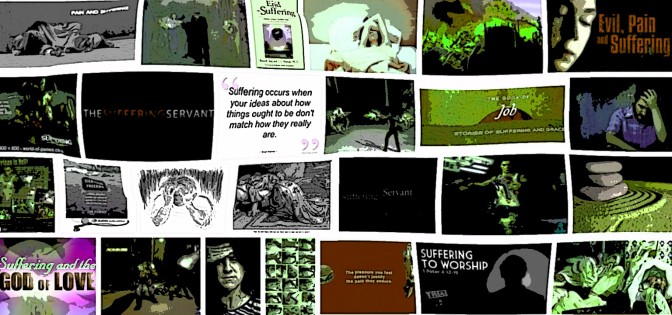 My junior and senior English students had read Crime and Punishment and the book of Job. My bulletin board for the first quarter of school read “Suffering 4 doing evil is right; suffering 4 doing good is good” to encompass both the deserved suffering of the Russian protagonist and the undeserved suffering of the biblical character with I Peter 4:12-19 to further explain the difference. We had read about suffering, talked about suffering, and it was time to now write about suffering. Well, time for my students to explore suffering by writing; I didn’t realize I would as well.
My junior and senior English students had read Crime and Punishment and the book of Job. My bulletin board for the first quarter of school read “Suffering 4 doing evil is right; suffering 4 doing good is good” to encompass both the deserved suffering of the Russian protagonist and the undeserved suffering of the biblical character with I Peter 4:12-19 to further explain the difference. We had read about suffering, talked about suffering, and it was time to now write about suffering. Well, time for my students to explore suffering by writing; I didn’t realize I would as well.
The assignment was a 500-700 word, 5-paragraph essay based on this prompt:
Prompt: In Crime and Punishment, the character Porfiry Petrovitch states that “Suffering, too, is a good thing.” In a well-organized essay, defend, challenge, or qualify the validity of this assertion. Use evidence from your reading, observation, and/or experience to support your position. (In other words, you’re not limited to discussing Crime and Punishment; Job may lend itself well to this.)
When I assigned the prompt, my hope was that students would use the literature we were reading to support, refute, or qualify the statement, “Suffering, too, is a good thing.” For my Advanced Placement students, using literature was a requirement. I allowed a bit more leeway for my honors students, but the examples we worked through in class came directly from our literature.
One way to qualify Petrovitch’s statement, I suggested, was to show that most of the characters in Fyodor Dostoyevsky’s Crime and Punishment suffered in some way—poverty, hunger, sickness, alcohol addictions, forced prostitution, and, of course, the agony of guilt that plagued the protagonist ax murderer—but how they responded to the suffering determined whether suffering was, indeed, “a good thing.” The girl, Sonya, who was forced into prostitution due to her family’s poverty, became stronger in character and more sensitive in nature to others’ sufferings; for her, suffering was a good thing. The murderer, Raskolnikov, was tormented by guilt; suffering drove him to confession and punishment and, as it turns out, happiness. For him, suffering was good. For another character, Katarina, the wife of a drunk, suffering was not good. She caved under suffering, becoming hungry, sick, and bitter, eventually dying in her suffering. Petrovitch’s statement, therefore, could be qualified; the attitude toward suffering determines whether “suffering, too, is a good thing.”
A way to support the idea that “suffering is good,” is to look at the story of Job. As I discussed in my earlier blog post regarding this Bible character, suffering for Job was, ultimately, a good thing. Job’s suffering led him to the very presence, the very heart of God. Yes, God rewarded Job with an even larger fortune and more beautiful family than he had when he started, but the real boon to his experience was knowing God up close and personal. Job’s example would be one of many in the Bible that would support that Christians should expect suffering—and understand that “suffering, too, is a good thing.”
These ideas were along the lines of what I expected to read when students submitted their papers on Wednesday. Tuesday after class, however, a senior asked me if I might have time to look at her rough draft after school. For a student who wants to do her best, I gladly will make time and did.
She began her essay this way:
It seems rather odd that the thing many people avoid most is actually good for them. It is hard to grasp the concept that something humanity hates so much can so naturally produce within each person a stronger, bolder, more peaceful and more steadfast spirit. Why do people hate suffering so much then? It hurts and it’s scary; usually it’s out of a person’s own control. It could be ventured to be said that suffering is another great evil introduced by sin that man was not created for, but that God has taken into His own hands to create something better of—that is the sort of person God is. Suffering is a positive thing in that it is a mark of Christianity, it strengthens and produces endurance within faith, and it pushes Christians to cling closer to the Father.
Together, we looked at each paragraph in support of her thesis, discussing ways to make the paper stronger, picking at technicalities in an effort to create that perfect paper. I thought her paper strong, in both proving her thesis as well as its demonstration of writing skills, and encouraged her. I particularly liked her first point, that suffering is a mark of Christianity. It made me think of suffering as prestigious, like a street sign indicating “GOD AT WORK.”
“You ought to write a blog,” I said. (The highest praise I can give, of course!) We highlighted a couple of sentences I felt she could improve, and then, I thought, we were finished.
As she put away her laptop, she said,
“Did I get it right? I wrote what I thought, but I know I haven’t really suffered yet. I know you have suffered; I was wondering if you agreed with the prompt. Has suffering been good for you?”
Wow.
What followed was a conversation I won’t soon forget.
“Yes. Suffering has worked good in me,” I said quickly. Despite the pain in certain situations, I know it has been for my good. Like Job, times of suffering have renewed my love for God and my awareness of His presence.
As I spoke with this student, I said that her youth didn’t necessarily mean that suffering hadn’t affected her. I pointed to incidents in my early life in which my parents likely suffered more than I but how I got to see God’s faithfulness to them. Because I marked those instances in my memory, they have proved effective in reminding me of God’s faithfulness when troubles later came my own way.
But as we continued to converse, I found myself realizing, perhaps confessing aloud for the first time, how I haven’t allowed suffering to do all it could do in my life.
For one thing, my tendency when suffering is to get through it as quickly as possible. Sometimes I have suffered because of something someone else has said or done—quickly forgiving or “accepting the penalty for another’s sin.” Maybe too quickly forgiving , rather than confronting and allowing that person to grow as well, I have chosen to act as if that incident didn’t happen. I have moved on too quickly, perhaps, shortchanging suffering for me and for someone else.
I also have had the tendency to avoid suffering. It didn’t take me long in life to make the connection that drawing closer to God drew Satan’s attention and ire. “Consider my servant Job,” God said to Satan at the start of Job’s recorded story. To avoid a similar “Consider my servant Sara” scenario, I admit that, at times, I have lived a less fiery Christian life than I might have—in an effort to move under Satan’s radar and avoid the suffering he might inflict should I live on fire for the Lord. So fear of suffering has stunted my spiritual growth.
In those ways I have shortchanged the impact suffering might have had in making me more mature.
The Apostle Paul said:
“… we rejoice in our sufferings, knowing that suffering produces endurance, and endurance produces character, and character produces hope, and hope does not put us to shame, because God’s love has been poured into our hearts through the Holy Spirit who has been given to us” (Romans 5:3-5, ESV).
While I can’t say I always choose to rejoice in my sufferings (or allow suffering to produce endurance, character, and hope in me), I am rejoicing in an essay assignment that prompted this conversation regarding the role suffering could have in my life, should I fully embrace it. And I am fully aware that I should. Thanks to my student asking that challenging question.
Out of the mouth of teens. 🙂


Great post. Wow! You dive deep.
LikeLike
Thanks!
LikeLike